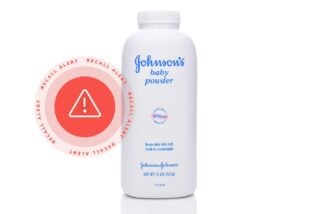
Last week, Johnson & Johnson recalled 33,000 bottles of baby powder after the U.S. Food and Drug Administration (FDA) found trace levels of chrysotile asbestos in samples from one bottle bought online. The company issued a voluntary recall of the bottle’s lot (#22318RB) in response to the testing, and the FDA urged consumers to stop use immediately.
Although this is the first time Johnson & Johnson has recalled baby powder over asbestos concerns, this is not the first instance in which the company has dealt with issues surrounding asbestos-contaminated talc products. In the past few years, Johnson & Johnson has been involved in thousands of lawsuits alleging its contaminated talcum powder products are causing ovarian cancer and mesothelioma. The company has maintained that its products are safe and asbestos-free throughout ongoing litigation.
Johnson & Johnson’s History of Asbestos Contamination
In a news bulletin, Johnson & Johnson explained it voluntarily recalled the potentially contaminated baby powder “out of an abundance of caution.” The company noted the FDA’s testing of samples indicated the presence of sub-trace levels of chrysotile asbestos contamination, or no greater than 0.00002%. The samples came from a single bottle purchased from an undisclosed online retailer.
Johnson & Johnson further explained it will work closely with the FDA and conduct its own testing to ensure the integrity and accuracy of these latest findings. The company states that until further testing, it cannot prove if:
- The sample came from an authentic Johnson & Johnson product
- The bottle was properly sealed or prepared in a controlled environment
- The sample presented a false-positive as a result of cross-contamination
Additionally, Johnson & Johnson stated it has rigorous testing in place for asbestos and an FDA test conducted one month ago showed no asbestos in the company’s talc products.
Although the company maintains that its products are safe and asbestos-free, various documents have suggested otherwise. An investigation showed the company was aware of asbestos contamination at several of its talc sources since the late 1950s. The company had its talc sources tested again in the 1970s and periodically through the early 2000s. All of these tests reportedly showed trace levels of several types of asbestos fibers, and Johnson & Johnson didn’t report these results to the FDA.
By 1973, regulations were put into place for better testing of asbestos in talc to prevent any contaminated products from reaching the marketplace. However, advocates have noted that the cosmetic industry has been largely unregulated for decades.
With the most recent finding of asbestos in Johnson & Johnson baby powder, company stock has reportedly suffered its greatest loss of the last ten months, with a drop of about 6.2%. The company also currently faces more than 15,000 lawsuits related to its talc products.
New Study Linked Asbestos-Containing Talc to Mesothelioma
In the past few years, consumers and health advocates have become increasingly concerned about the safety of cosmetic talc. Various makeup products from Claire’s and Justice have been recalled because of the presence of asbestos. Just last month, makeup from Beauty Plus Global was recalled because of asbestos contamination.
Health concerns regarding asbestos in talc have grown in recent years, though the possible link between contaminated talc and cancer was first explored in the 1970s. Researchers have continued to study the connection between talc and health risks, including ovarian cancer and mesothelioma.
This month, a new study was published that linked 33 mesothelioma diagnoses to asbestos-contaminated talcum powder. The researchers noted tissue samples from the patients showed asbestos fibers consistent with those found in contaminated talcum powder.
The study further noted the participants had no other known history of asbestos exposure besides the talcum powder. Several of the patients used talcum powder products daily for decades.
With this recent Johnson & Johnson baby powder recall, along with various makeup recalls and other asbestos-contaminated products, the FDA stated it is dedicated to developing better regulations for the cosmetic industry. In recent months, the agency has conducted more frequent testing of talc products. It also stated it is working on developing new standards for talc safety testing to improve accuracy and consistency.




